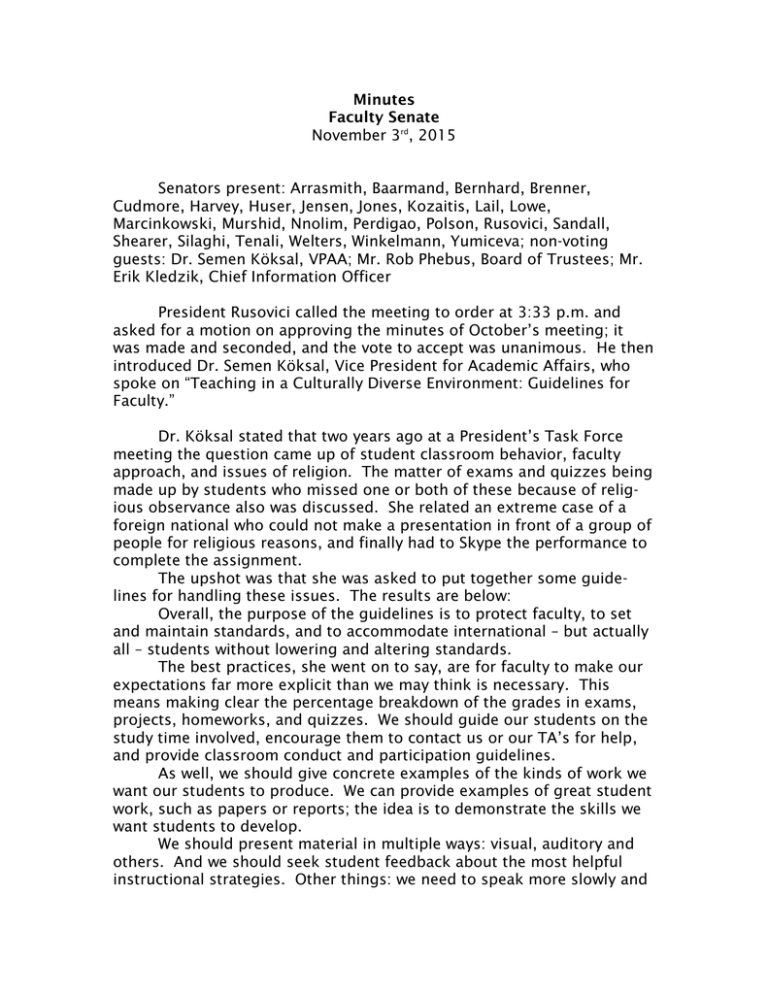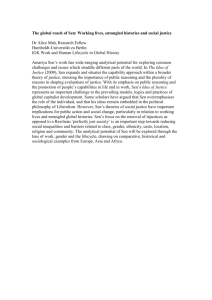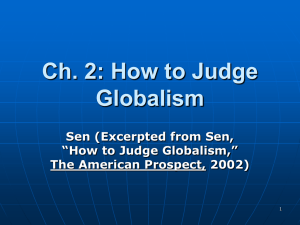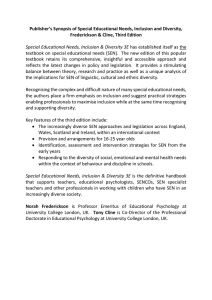November 2015 Minutes #113
advertisement

Minutes Faculty Senate November 3rd, 2015 Senators present: Arrasmith, Baarmand, Bernhard, Brenner, Cudmore, Harvey, Huser, Jensen, Jones, Kozaitis, Lail, Lowe, Marcinkowski, Murshid, Nnolim, Perdigao, Polson, Rusovici, Sandall, Shearer, Silaghi, Tenali, Welters, Winkelmann, Yumiceva; non-voting guests: Dr. Semen Köksal, VPAA; Mr. Rob Phebus, Board of Trustees; Mr. Erik Kledzik, Chief Information Officer President Rusovici called the meeting to order at 3:33 p.m. and asked for a motion on approving the minutes of October’s meeting; it was made and seconded, and the vote to accept was unanimous. He then introduced Dr. Semen Köksal, Vice President for Academic Affairs, who spoke on “Teaching in a Culturally Diverse Environment: Guidelines for Faculty.” Dr. Köksal stated that two years ago at a President’s Task Force meeting the question came up of student classroom behavior, faculty approach, and issues of religion. The matter of exams and quizzes being made up by students who missed one or both of these because of religious observance also was discussed. She related an extreme case of a foreign national who could not make a presentation in front of a group of people for religious reasons, and finally had to Skype the performance to complete the assignment. The upshot was that she was asked to put together some guidelines for handling these issues. The results are below: Overall, the purpose of the guidelines is to protect faculty, to set and maintain standards, and to accommodate international – but actually all – students without lowering and altering standards. The best practices, she went on to say, are for faculty to make our expectations far more explicit than we may think is necessary. This means making clear the percentage breakdown of the grades in exams, projects, homeworks, and quizzes. We should guide our students on the study time involved, encourage them to contact us or our TA’s for help, and provide classroom conduct and participation guidelines. As well, we should give concrete examples of the kinds of work we want our students to produce. We can provide examples of great student work, such as papers or reports; the idea is to demonstrate the skills we want students to develop. We should present material in multiple ways: visual, auditory and others. And we should seek student feedback about the most helpful instructional strategies. Other things: we need to speak more slowly and clearly, occasionally rephrasing statements in simple sentences. We can use questions to facilitate comprehension (e.g., “What do you know about it?” “What don’t you understand about it?”). We need to provide instructions in writing for assignments and inclass activities. It’s a good idea to display key words to facilitate comprehension, and the use of dictionaries should be allowed. Of course, it’s important to use culturally neutral examples. We need to allow adequate opportunity for students to apply knowledge and skills by writing, classroom discussions, oral reporting, and step-by-step problem solving in a low-pressure context while providing generous feedback. We can always give students sets of questions and tips for reading and studying efficiently. We ought to consider giving practice tests, writing assignments, etc., and allow students to work on problems or assignments in pairs or small groups. It is necessary to design opportunities for high-quality interaction; to this end we can plan student-faculty interaction, student-to-student interaction, and monitor student groups’ interactions, taking note of active versus passive participants; the ideal is to foster communities of learning. The question of accommodating religious holidays remains an unanswered, sensitive issue. We are certainly required to respect religious views; however, there is no absolute policy in place. But faculty should provide course syllabi that specify exam and assignment due dates. With regard to students taking religious holidays, Dr. Köksal was very explicit: it is the student’s responsibility to consult the faculty member promptly regarding any possible conflicts with major religious holidays. A student must make a request for a reasonable accommodation for the conflict by the end of the second week of classes. Most importantly, faculty have the right to say “no” if students haven’t arranged to take a religious holiday prior to the end of the second week. Should there be a calendar of religious holidays? She said she found that the University of Minnesota does this, but questioned whether this is a good idea for us, and pointed out that the Quality of Life Committee unanimously favored not creating an official religious holidays calendar. This last issue was given much discussion by the Senate. Indeed, that students would take unfair advantage using such a list is a real possibility. Speaking of student manipulation, Dr. Köksal related a story of a student of hers who, as she put it, “managed to kill four grandmothers in one semester”; seemingly taken innocently aback at one point, she asked, “How many grandmothers do you have?” She concluded her remarks by stating that she is always available to faculty, via phone, email and visits to her office. 2 Dr. Rusovici thanked Dr. Köksal for her comprehensive presentation, and, before opening the floor for questions to her, introduced two attendees of the meeting: Mr. Rob Phebus of the Board of Trustees, who is chair of the Academic Affairs Committee there, and Dr. Phil Bernhard of the Bisk College of Business, and Computer Science. Senator Cudmore said he saw problems with publishing a list of religious holidays, with students making vague connections to various religions and deciding to take holidays. Sen. Baarmand was outspoken on the role of Florida Tech with regard to religion: we are a non-denominational academic institution, he said, and there should be no observance of religious holidays at all. If we give privileges to one religion then we have to give them to all – and there are nearly 4,000 of them; the issue, he added, is “a can of worms.” Instead of the University of Minnesota setting an example, we should turn the tables on that. Sen. Arrasmith agreed that students would manipu-late the list for their own advantage. Sen. Marcinkowski supported the view expressed earlier by Sen. Nnolim that the list could actually work to faculty’s advantage, making our job easier, but suggested that we not create this list. Rather we could post online links to selected lists from other universities for faculty reference purposes. Pres. Rusovici said he disagreed with viewing this as an accommodation (similar to accommodations identified by Counseling and Psychological Services, or CAPS), since there is no room or personnel to accommodate proctoring for make-up work. Sen. Marcinkowski went on to say that we could set a maximum number of excused and unexcused absences, and make clear how many more absences would affect a student’s grade. Further, he pointed out that, as suggested by Dr. Koksal, if we are notified within two weeks from the beginning of the semester, we would have to count these as excused absences. Sen. Sandall asked if, by coming up with a list of religious holidays, we might be sanctioning the taking of the holidays. Sen. Nnolim pointed out if we had such a list, we would have to plan around those days on our syllabi, and as well, having a list means having policy guidelines. Two matters were presented to Dr. Köksal for her consideration: whether we should have a calendar of religious holidays, or not; and a policy to accommodate the calendar, but to what extent. Sen. Arrasmith stated that, as things stand, the matter is up to the individual professor. Sen. Winkelmann added that if we make students’ lives more difficult, they will complain. Dr. Köksal noted that guidelines here will be a benefit to the professor. Sen. Cudmore suggested that our syllabi should include the phrase, “we will try to accommodate” students on the matter of religious holidays. 3 Dr. Köksal closed the discussion session with the statement that should the Senate decide that existing policy is okay, she’ll be glad to acknowledge that. President’s Report Pres. Rusovici stated that admission standards for the incoming freshmen were tightened. Incoming freshmen SAT scores went up according to plan, and were approximately at 1200; hence, a shortfall of about forty-five students was registered by admissions. Approximately thirtythree international students were also unable to enroll due to visa delays. The focus of the incoming administration is to strengthen university research. The administration is aware of both lab space and classroom limitations, and this will be addressed by building a new classroom facility in the Olin quad as well as by terminating commercial leases in the Oaks Plaza; this action will free up to 10,000 square feet. Committee Reports There was no Academic Policies Committee report. Sen. Brenner reported that his group, the Administrative Polices Committee, had taken a look at Sen. Baarmand’s proposed resolution on revising sabbatical leave policy, and approved of it. There was no Faculty Senate Scholarship report. Sen. Baarmand, chair of the Faculty Excellence Committee, reported that the committee now has six members. Sen. Cudmore, head of the Welfare Committee, reported that his committee also favored Sen. Baarmand’s resolution. He added that his committee is working on a formal complaint-handling policy for faculty, with concern for the issue of anonymity; he considers this an issue of how faculty can protect themselves. And, it appears the parking issue has reared its Gorgon head once more. He went on to say that he is still working with the matter of clarification of the liability for online instructors, and the issue of maternity/paternity leave, for which he said a policy is needed to facilitate the efficient and pragmatic realization of this right. Sen. Harvey agreed to serve on his committee. The special committee on technology, the Technology, Resources and Infrastructure (TRI), chaired by Sen. Arrasmith, met on the 21st of October. It now has six members, with representatives from the College of Engineering, the College of Science, the Library, and Instructional Technology (IT). Rather than have duplicative efforts with ACITC (ACademic Information Technology Committee), the TRI Committee will have Mr. Erik Kledzik sitting on both the ACITC and TRI committees. The 4 Senate will have a representative for the IT Executive Committee. Sen. Arrasmith said he would welcome anyone who wants to join his group. Pres. Rusovici asked what the first action item was for the committee, and Sen. Arrasmith answered that was the redoing of the Faculty Senate Web page, making important links, some to training videos. Old Business A vote to approve the special TRI Committee was taken. It passed with twenty-two senators voting “aye,” and two abstentions. Sen. Baarmand read his resolution: WHEREAS the current faculty sabbatical leave policy allows for faculty to become eligible to apply after three or more years of service, and to apply for one sabbatical leave every seven years in the form of one academic term with full pay or one academic year with half pay, and WHEREAS those faculty who have not taken sabbatical leave for many years could benefit from a longer leave to achieve superior scholarly growth, THEREFORE BE IT RESOLVED that the Faculty Senate respectfully request the Administration to consider allowing full-time faculty to accumulate sabbatical leave one academic term per seven years up to a maximum of one academic year with full pay. As an example: if no sabbatical leave was taken in the past fourteen years, then a full-time faculty member would be eligible to apply for one academic year of leave with full pay. The applicant must justify the necessity for one academic year to fulfill the sabbatical leave purpose. The resolution passed by a vote of twenty senators in favor, with four abstentions. Adjournment By unanimous consent, the meeting was adjourned at 4:50 p.m. Respectfully submitted, Bob Shearer, Secretary 5



